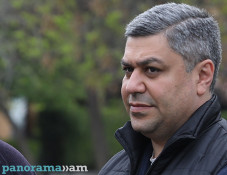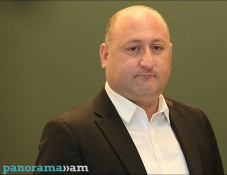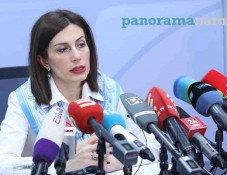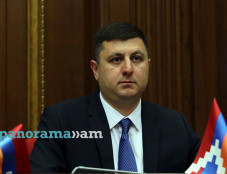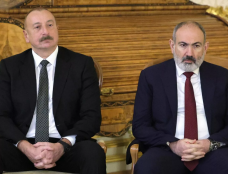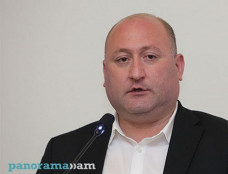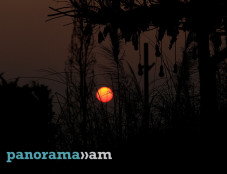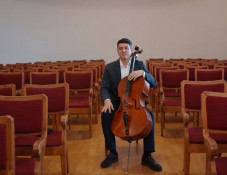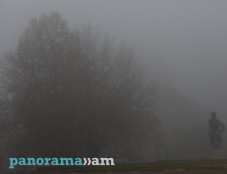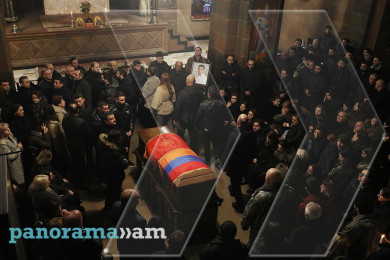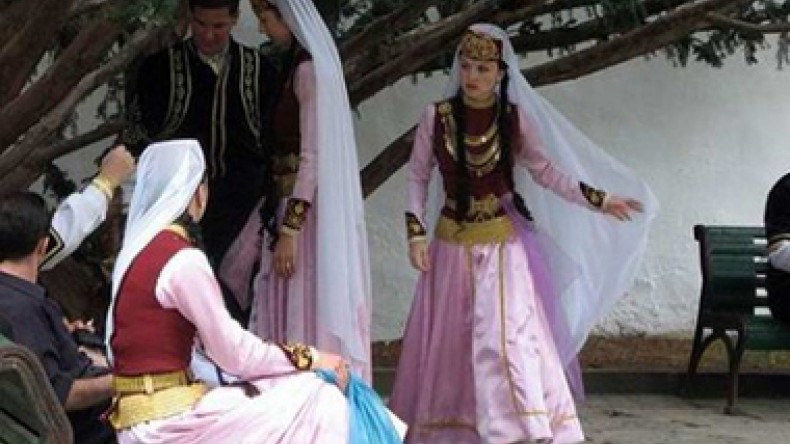
Scientific publication of Russian Empire: Transcaucasian Tatar women felt warm and cosy next to dung
In the 20th issue for the year 1894 of the project “Collection of Materials to Describe the Terrain and Tribes in the Caucasus,” the teacher and supervisor of the Batumi vocational school, A. Zakharov, published an article, in which he recounts Transcaucasian Tatars’ traditions of family life and their perceptions of women and beauty.
Getting as a woman in a completely alien environment, a girl finally lost her freedom. If at her parents’ house, she had no right to speak to men other than her family members, in her husband’s house she could not even speak to the male members of the family. She used pantomime in case she needed to tell something to her husband’s little brothers. At the presence of a third person, she could not go up to her husband or speak to him even in whisper. She mainly saw him at nights. “Her face is covered with yashmak all the time. Saying that a young woman ‘has an open face’ means she is immoral. Only after the first child is born, the woman throws away the cover and is granted the right to speak with her closest relatives,” Zakharov writes.
A young woman’s activities were limited in doing household chores in the first year of her marriage. She was not loaded with hard work. She was also seldom allowed to go out.
In case she went somewhere, she was always accompanied by her mother-in-law, who replaced her mother in her husband’s home. As Zakharov described her, the mother-in-law was “a morality supervisor” for the young daughter-in-law. She was very strict and demanding to her: the daughter-in-law had to be by her side the whole day, fulfill all her orders and caprices, which were, however, seldom satisfied. “The mother-in-law’s hard and peevish character was the cause of the many misfortunes in the family life. With the mother-in-law, a Tatar woman’s life, which was difficult even without her, turns into a real hell,” he writes.
She would not let the young daughter-in-law have a minute of rest, while the young woman had no right to complain of her fate to her husband. She went to bed when everyone was already asleep, and got up when no one had still woken up. “Woe to her, if the mother-in-law wakes up and finds her lying,” Zakharov writes. He finds that the old mother-in-law vented on her daughter-in-law all the humiliations and insults she experienced in youth.
However, sometimes there were such strong characters among the young women who were able not only to tame the mother-in-law’s wicked temper, but also command respect and even fear towards them, turning into wicked geniuses for their husband’s mother. “I have frequently met old women beaten and bloodstained by their daughters-in-law. They were especially merciless towards the weak, ill women, who had lost their physical strength. In a word, there is an unceasing struggle between the mother- and daughter-in-law in the Tatar family. It depends on the man who will win the struggle, however, it is considered awkward if the husband supports his wife,” the author writes.
A Tatar villager considered his wife to be a working animal, and even the illness was not a serious reason to free her from a hard work. During spring, autumn and summer, the woman was so overloaded with work, that she had no minute of rest and had no time to think about something else. After harvesting, the men gave up themselves to idleness leaving the women to finish up the rest. The woman worked in the field, in the garden, at home. Every now and then, one could meet women with big baskets on their backs and wooden bowls filled with fruit on their heads in rural streets.
“The hard work ruins the woman’s organism. She soon loses the activity of movements and in twenty, she looks like an old woman. One can seldom meet a woman with healthy eyes in Tatar villages for the pressed dung’s corrosive smoke quickly spoils her eyesight. Shoes are considered to be a decoration for the woman, that is why she is barefoot both in summer and in winter, which is also harmful for her health. In addition, the nutrition of the Tatar woman in villages is very poor: barley or unleavened bread with sheep cheese or sour milk are her food the whole year round. She makes lentils or peas once or twice a week. Once in a while, the villagers indulge in pilaf and milk porridge. They eat meat twice or thrice a year, on big holidays or family celebrations. However, only men are treated with meat, while the women and children get only the gnawed bones. The burden of the backbreaking labor makes the Tatar woman apathetic. She seldom sings her sad bayatis,” the author notes.
Unlike their rural counterparts, the urban women led an extremely monotonous and idle life. The head of family went to bazaar on his businesses in the morning and returned late at night, while his wife stayed at home without having nothing to do. She did not make dinner as the Tatars did not dine in the daytime. They ate once a day, in the evening, while in the daytime they satisfied themselves with a piece of bread and cheese or fruit. By the evening, they prepared “shorwa with meat.” Zakharov writes that he knew Tatar millionaires in Baku whose expenses on food in the daytime did not exceed 5 kopecks, which included 3 kopecks on churek and 2 kopecks on cheese and onion.
In order to kill time, the Tatar woman visited her neighbors and invited them to her place to chat spending the whole day on empty conversations. “The women’s chats often turned into quarrels and such a bad language one can seldom hear even in the bazaars,” he notes.
The author also writes about a notable peculiarity of the urban Tatar women – their passion for fallals and bright materials. They could easily change a couple of hens or wheat for a shining button or penny earrings. The hucksters took advantage of that and pitilessly exploited them. There were many jokes about how a sly trader skillfully deceives a naïve villager often using her superstitions. “Once I was really surprised to notice that many women in a remote Tatar village had penny-worth little keys of clocks with compass. I knew that the Tatar women had no idea about compasses or their usage. After inquiring, I learnt that a cunning trader had sold those keys to them as talismans protecting from the evil eye and illnesses. The superstitious women’s imagination was shocked as they saw the arrow below the glass go around by itself. They attributed this to the ghost sitting under the glass,” the author recalls.
Zakharov further writes about the original “women’s clubs” called “oda”, which they organized in the wealthy villagers’ stables. “The women feel warm and cosy by the dung. They spend whole hours sitting on straw with tightened legs,” he writes noting that meanwhile they each did their work “without forgetting to operate their tongue.” The old women here told about miracles various saints performed and explained dreams or natural phenomena. “From the old Tatars’ conversations, a young Tatar woman draws all monstrous prejudices and superstitions, which a Tatar woman’s life is so rich in. Here she finds nutriment for her imagination and her fantasy ignites with tales about monsters, seven-headed divas and young hero athletes. The more supernatural the tales, the more they are loved for it is pleasant to tear away from the routine life just for a brief time to be taken into a fairy world of wonders and fantastical fantasy,” the author writes.
However, the men were also big fairy-tale hunters. There used to be several old men in each village whose memory preserved ancient legends and traditions totally unchanged. Gathering in the evenings, the Tatars would attentively listen to amusing tales or episodes from the storyteller’s life. Zakharov writes about witnessing one of such gatherings. He describes a khan’s servant, who was telling about his trip to Moscow with his master. He enjoyed his fellow-villager’s respect due to that.
“He was telling them about countries, people, seas, ships, railway. He exaggerated all this to the point that I could hardly guess what he was speaking about,” he writes.
He literally slobbered as he started to speak about the Russian “khanums” claiming that there were no ordinary women there, they were all “matyushkas.” The Tatars used to call the Russian and European women “matyushkas,” which was an equivalent to the notion “madam.”
“They dress better than the khan’s wife. I am speechless about their beauty. Our women look like hungry jackals. Their feet resemble drumsticks, and necks – pear stalks. They are black as ravens, dirty as pigs. While the women there are white like snow, ruddy, beautiful. In short, one had no desire to eat or drink but admire their beauty,” the former servant said. Zakharov notes that although the story was really exaggerated, it was obvious that the direct contact with the civilization and morals in Russia had had a significant influence on the storyteller.
“Eh! What do we know, what do we see? We were born donkeys and will die donkeys,” the old man sighed.
The “Collection of Materials to Describe the Terrain and Tribes in the Caucasus” is a large-scale publication of narrative sources carried out by the management of the Caucasus Educational Okrug in 1881-1908. It includes researches and description of the history, life, and ethnographic characteristics of the peoples inhabiting the Caucasus region of the Russian Empire.
Related:
Scientific publication: Azerbaijan Tatar children played in manure, women’s untidiness became proverb
Scientific publication of Russian Empire: Tatar women were known for unbridled speech and indecent tricks
Scientific publication: Armenian girl thinks it mortal sin to go against father, Tatar girl is indifferent to family
Newsfeed
Videos





